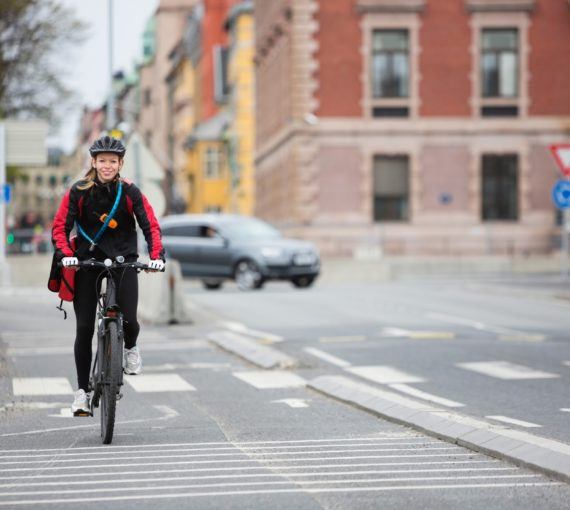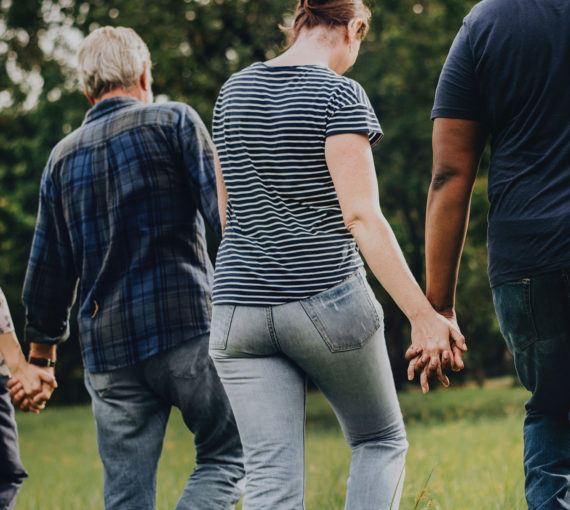
Using your city or town’s public bike share system is a great way to take part in active transportation without owning a bicycle. (Photo: Uriel Mont via Pexels)
Data gathered in 2024 revealed that more than 16.5 million people in Canada commute to work. That’s over 40 per cent of the population! Four in five commuters travel to work in a gas-powered personal vehicle.
Let’s try to make cleaner, greener transportation choices whenever we can. Choosing better methods can benefit you and nature.
Alternatives to driving
Instead of driving, consider:
- Carpooling
- Cycling
- Public transit (bus, train, streetcar, etc.)
- Skateboarding
- Scootering
- Rollerblading
- Walking
- Wheeling (motorized or manual wheelchairs or mobility scooters)
- Telecommuting
You’ll reduce your carbon footprint and engage with the space between your home and destination. Most alternatives to driving offer great opportunities to explore sights and sounds. You may even discover a new local business or bump into an old friend — or make a new one!
Cycling teaches us to be alive to what’s in front of us — the demands of living compassionately now — and not immersed in abstraction.
Gideon Forman, “Beckett’s bicycle: Lessons on cycling from the great dramatist”
Why choose active transportation?
Active transportation is any human-powered method (e.g., walking, cycling, using a wheelchair, etc.).
Active transportation benefits
- Health. Increases physical activity improves cardiovascular fitness and boosts mental wellbeing.
- Sustainability. Often produces no emissions. Reduces traffic congestion and air pollution. For sustainability, it’s the best personal transport choice!
- Affordability. Saves money on fuel, vehicle maintenance, parking and transit fares.
- Community. Reduces isolation. Inspires community interactions. Promotes equity. Encourages independent mobility.
Some people may experience limitations to active transportation because of age, health or ability. If that’s you, consider exploring other sustainable options — electric bicycles and scooters, motorized wheelchairs or public transit. You’ll model alternatives to gas-powered options!
Make it fun! Organize a commuter challenge
People will stick with a habit that feels like a rewarding challenge rather than a sacrifice. Gather friends, family or colleagues and organize a commuter challenge for a week or longer!
Changing your commute requires a major behavioral shift. You may meet resistance from group members. (“The bus never came!” “I got soaked on my bike ride!”) Talk about barriers and see if there’s anything you can do to overcome them as a team. Use our climate change conversations guide to emphasize the importance of this challenge to your values and to protecting the planet.
Steps to organize a commuter challenge
See if your city or town hosts a smart commuter challenge. Search online for “smart commuter [your city].” If it doesn’t, use these steps as a framework for building your own.
Step one: Set a goal
Decide on the challenge length and what counts as participation (e.g., taking public transportation three times a week, using only active transportation, etc.)
Step two: Build a supportive team
Appoint commuter captains to encourage participation and share tips. Encourage creation of a group text message thread, social media group or email list where you can post announcements and share personal wins and insights.
Step three: Share resources and skills
Share transit schedules, cycling routes, bike-sharing locations and carpooling options. Tap into your group members’ skills. Host skill sharing opportunities like a bike tune-up workshop or running clinic.
Step four: Track progress
Use trip-logging apps or a shared spreadsheet to track modes of transport, insights, impacts and obstacles.
Step five: Communicate and share wins
Use your group chat, social media group or email list to keep motivation and spirits high. Encourage friendly competition among group members, always maintaining a positive and encouraging attitude. Offer small prizes or incentives.
Step six: Measure impact
Understanding the impact of your commuter challenge can inspire continued change. Use online calculators to estimate emissions eliminated.
Step seven: Celebrate
Hold a virtual or in-person event to share photos, stories, barriers, successes and impact. Award the most committed individuals or groups (e.g., Public Transport Pros, Carpool Champions, Most Improved Commuters, etc.).

Create a workplace green team
Organizing a workplace commuter challenge? Consider starting a workplace green team! Inspiring climate action has many economic, social and wellbeing benefits.
Practical tips for walking and cycling
We asked David Suzuki Foundation staff what tips they have to share about cycling and walking. Here’s what they had to say!

Dress appropriately
- Wear brightly coloured clothes and helmets to increase your visibility. (It’s important to remain safe and seen on roads and paths!)
- Incorporate reflective gear into your outfit when possible. This could even be achieved by adding reflective patches onto your gear.
- Dress warmly for colder seasons. Staff emphasized the comfort provided by wool socks, proper shoes, appropriate coat and even shoe covers.
- Don’t overdress in warmer seasons. Biking is a sport and you want to be comfortable. Wear layers that are easy to add or remove.

Be present and explore
- When walking, take the opportunity to unplug and engage in a “walking meditation.”
- Change routes to keep things fresh and explore neighbourhoods.
- Look for flowers, birds, graffiti or neighbourhood “little libraries” and book exchanges.

Be ready
- Have an umbrella, hat, gloves and rain jacket in case the weather changes during your journey.
- Pack water and snacks.
- If you’re on a bike and have space, carry a hand-held tire pump.
- Bring a panier, backpack or reusable tote for items you may need to carry.
Make your voice heard
It’s time to speed the transition to sustainable transportation alternatives. Governments need to invest in the necessary infrastructure and enact supportive policies. You can speak up for sustainable transportation options that increase the well-being of your community!



